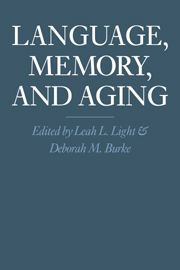Book contents
- Frontmatter
- Contents
- List of contributors
- Preface
- 1 Theories of information processing and theories of aging
- 2 Effects of aging on verbal abilities: Examination of the psychometric literature
- 3 Aging and individual differences in memory for written discourse
- 4 Geriatric psycholinguistics: Syntactic limitations of oral and written language
- 5 Aging and memory activation: The priming of semantic and episodic memories
- 6 Automatic and effortful semantic processes in old age: Experimental and naturalistic approaches
- 7 Integrating information from discourse: Do older adults show deficits?
- 8 Comprehension of pragmatic implications in young and older adults
- 9 Capacity theory and the processing of inferences
- 10 Age differences in memory for texts: Production deficiency or processing limitations?
- 11 Episodic memory and knowledge interactions across adulthood
- 12 The disorder of naming in Alzheimer's disease
- 13 Language and memory processing in senile dementia Alzheimer's type
- 14 Patterns of language and memory in old age
- Author index
- Subject index
8 - Comprehension of pragmatic implications in young and older adults
Published online by Cambridge University Press: 05 January 2012
- Frontmatter
- Contents
- List of contributors
- Preface
- 1 Theories of information processing and theories of aging
- 2 Effects of aging on verbal abilities: Examination of the psychometric literature
- 3 Aging and individual differences in memory for written discourse
- 4 Geriatric psycholinguistics: Syntactic limitations of oral and written language
- 5 Aging and memory activation: The priming of semantic and episodic memories
- 6 Automatic and effortful semantic processes in old age: Experimental and naturalistic approaches
- 7 Integrating information from discourse: Do older adults show deficits?
- 8 Comprehension of pragmatic implications in young and older adults
- 9 Capacity theory and the processing of inferences
- 10 Age differences in memory for texts: Production deficiency or processing limitations?
- 11 Episodic memory and knowledge interactions across adulthood
- 12 The disorder of naming in Alzheimer's disease
- 13 Language and memory processing in senile dementia Alzheimer's type
- 14 Patterns of language and memory in old age
- Author index
- Subject index
Summary
It is well known that memory declines with advancing age. However, the reasons for this impairment in memory are not understood (Burke & Light, 1981). One explanation that has gained currency is that older adults do not process the meaning of new information as effectively as young adults because of reduced processing resources or attentional capacity (e.g., Cohen, 1979, 1981; Craik & Byrd, 1982; Craik & Rabinowitz, 1984; Eysenck, 1974; Hasher & Zacks, 1979; Perlmutter, 1978; Simon, 1979; Till & Walsh, 1980). This explanation presupposes that there are age-related differences in comprehension of word meanings. The bulk of the research in this area has not, however, produced results in accordance with this position (see Light, 1988, for a review). For instance, there is little evidence for age-related declines in vocabulary (Schaie, 1980). The organization of meanings in semantic memory, as indexed by responses on word association tasks, appears to be stable in adulthood (e.g., Burke & Peters, 1986; Howard, 1980). Also, studies of semantic priming in lexical decision tasks find no qualitative differences in the nature of activation of meanings in semantic memory (e.g., Burke & Yee, 1984; Howard, this volume).
Despite these negative findings, there has been a recent spate of suggestions that older adults may experience language comprehension problems (see Burke and Light, 1981; Hartley, Harker, and Walsh, 1980; Hultsch and Dixon, 1984; and Salthouse, 1982, for reviews).
- Type
- Chapter
- Information
- Language, Memory, and Aging , pp. 133 - 153Publisher: Cambridge University PressPrint publication year: 1988
- 15
- Cited by



